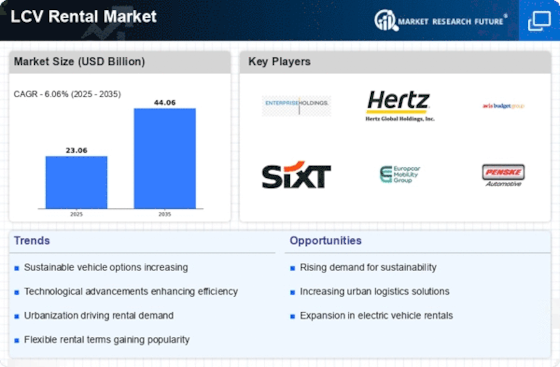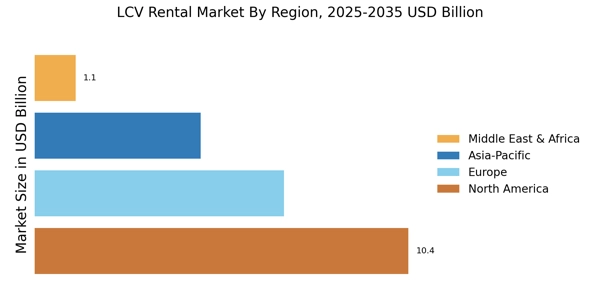Rising E-commerce Activities
The LCV Rental Market is experiencing a notable surge due to the increasing activities in e-commerce. As online shopping continues to gain traction, businesses require efficient logistics solutions to meet consumer demands. This trend has led to a heightened need for light commercial vehicles, which are essential for last-mile delivery services. In fact, the demand for LCV rentals has been projected to grow at a compound annual growth rate of approximately 6% over the next few years. This growth is driven by the necessity for businesses to adapt to changing consumer behaviors, thereby creating a robust market for LCV rentals.
Cost-Effectiveness of Rental Solutions
The LCV Rental Market is benefiting from the growing recognition of the cost-effectiveness associated with rental solutions. Businesses are increasingly opting for rentals over ownership to reduce capital expenditures and maintenance costs. This shift is particularly evident among small and medium-sized enterprises that may lack the financial resources to invest in a fleet of vehicles. The flexibility offered by rental agreements allows companies to scale their operations according to demand, thereby enhancing operational efficiency. As a result, the LCV rental market is likely to see a continued influx of businesses seeking economical transportation solutions.
Urbanization and Infrastructure Development
Urbanization plays a pivotal role in shaping the LCV Rental Market. As more individuals migrate to urban areas, the demand for transportation solutions increases. Cities are expanding, and infrastructure development is underway, necessitating the use of light commercial vehicles for various purposes, including construction and service delivery. The rise in urban population is expected to contribute to a significant increase in LCV rentals, as businesses seek to optimize their operations in densely populated areas. This trend indicates a potential for sustained growth in the LCV rental sector, as urban environments require adaptable and efficient transportation options.
Technological Advancements in Fleet Management
Technological advancements are significantly influencing the LCV Rental Market. Innovations in fleet management systems, such as telematics and real-time tracking, are enhancing operational efficiency for rental companies. These technologies enable better route optimization, fuel management, and maintenance scheduling, which can lead to reduced operational costs. Furthermore, the integration of mobile applications for booking and managing rentals is streamlining the customer experience. As these technologies become more prevalent, they are expected to attract more businesses to the LCV rental market, thereby fostering growth and competitiveness within the industry.
Environmental Regulations and Sustainability Initiatives
The LCV Rental Market is increasingly shaped by environmental regulations and sustainability initiatives. Governments are implementing stricter emissions standards, prompting businesses to seek greener transportation options. This shift is leading to a rise in demand for eco-friendly light commercial vehicles, including electric and hybrid models. Rental companies that adapt their fleets to meet these standards are likely to gain a competitive edge. The emphasis on sustainability not only aligns with regulatory requirements but also resonates with consumers who prefer environmentally responsible practices. Consequently, the LCV rental market is poised for growth as businesses prioritize sustainability in their logistics operations.

















